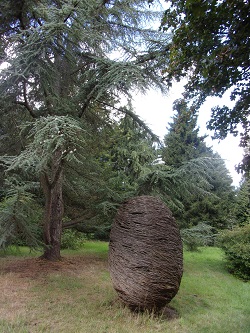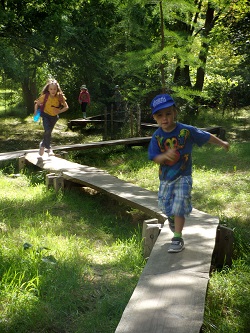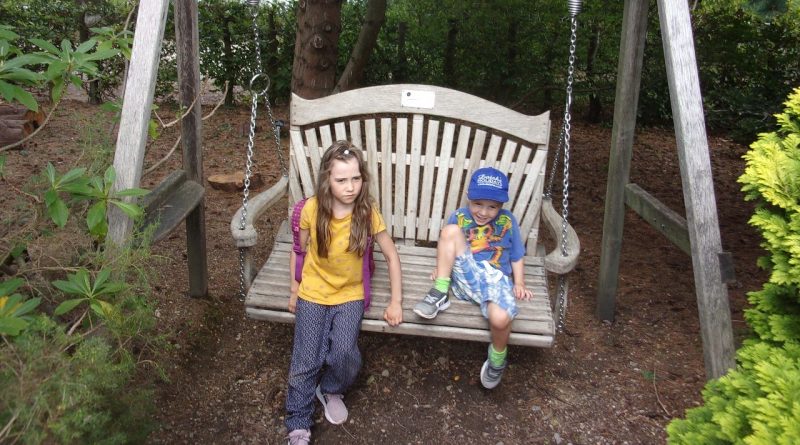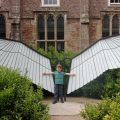A Trip to the Gardens
Mathematics is even more influential than I realised. It plays a vital part in nature, we discover during our trip to Sir Harold Hillier Gardens near Romsey, Hampshire. As we walk without a care around this wonderful garden we come across a sign about cones, which reads: “Pine cones are a mathematical marvel! The pattern of the cone follows the Fibonacci sequence, an amazing pattern found in nature. Each number in the sequence is the sum of the previous two numbers: 1, 1, 2, 3, 5, 8, 13 and so on. The pattern creates the spiral found in cones, starting at the base of the cone and spiralling out to the tip.” This same pattern and number sequence appears all over the natural world, for example in sunflowers and cacti. It allows for the most efficient use of space possible, covering the most surface area. Petals and leaves use this arrangement, too.
 At just under 180 acres this magnificent landscape is home to more than 42,000 trees and shrubs including magnolia and rhododendron.
At just under 180 acres this magnificent landscape is home to more than 42,000 trees and shrubs including magnolia and rhododendron.
On arrival there are a lot of visitors and we queue at 2m intervals to enter. It is also necessary to queue for the toilets but only at busy times. The entrance to the gardens is very busy and so social distancing is difficult but as all the visitors spread out we feel like we are on our own. The weather is good to us and we are able to explore much of the grounds.
We walk past a tall euonymus, which prompts me to recall the line from Sir John Betjeman’s A Subaltern’s Love-Song that refers to this very tree:
“Her father’s euonymus shines as we walk
And swing past the summer-house, buried in talk”
There are a number of metal sculptures of such things as cones and just up from these are some benches at the top of a hill so we make our way to them for our picnic. After lunch the children race back down. We have visited a number of gardens now and each one has its own unique design and appeal.
Throughout our visit little Henry (4) complains of this or that but being hungry mostly. So it is fortunate that we have brought enough supplies for the little lad. We’ll need to bring a separate trailer in future… Anybody would think we didn’t feed him, the way he carries on.
 And so it is a real joy when he forgets about all of this and starts playing hide and seek with sisters Harriett (9) and Heidi (7) in the gardens surrounding Jermyn’s House. Caroline and I are able to sit on a bench and relax while the children look for hide outs among the shrubs. They love roaming free.
And so it is a real joy when he forgets about all of this and starts playing hide and seek with sisters Harriett (9) and Heidi (7) in the gardens surrounding Jermyn’s House. Caroline and I are able to sit on a bench and relax while the children look for hide outs among the shrubs. They love roaming free.
Sir Harold George Hillier (1905 to 1985) was an English horticulturist. In 1921 he joined the family firm, Hillier Nurseries, his early career spent in assisting his father in rebuilding stocks depleted by World War I. He became partner in 1930 and head of the firm on his father’s death in 1944, leading the nursery’s expansion to become the leading British stockist of northern temperate trees and shrubs. From the 1950s onward he expanded his interest to gathering seeds and plants from the USA and worldwide, donating many endangered plants to collections such as Ventnor Botanic Garden and Wisley Gardens. His own collection, the Hillier arboretum, at Ampfield near Romsey, was presented as a gift to Hampshire County Council in 1977.
In 1972 he was made an honorary fellow of the Royal Horticultural Society, becoming vice-president in 1974. He received a CBE in 1971 and a knighthood in 1983 for services to horticulture.
A fine day out for all the family and a chance to relax and forget about life’s difficulties, just for a moment.







These garden look wonderful for the whole family to enjoy!
Great article I did not know about this place and will be definitely visiting once we are able to get out and about again
I’m really looking forward to getting out regularly with the grandchildren again. This place looks amazing. So glad you shared it with us